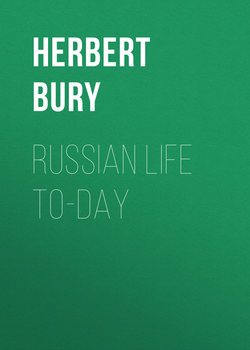Russian Life To-day

Реклама. ООО «ЛитРес», ИНН: 7719571260.
Оглавление
Bp. Herbert Bury. Russian Life To-day
INTRODUCTION
CHAPTER I. Russia’s Great Spaces
CHAPTER II. General Social Life
CHAPTER III. The Peasantry
CHAPTER IV. The Clergy
CHAPTER V. Religious Life and Worship
CHAPTER VI. His Imperial Majesty the Tsar
CHAPTER VII. A Paternal Government
CHAPTER VIII. The Steppes
CHAPTER IX. Russia’s Problem
CHAPTER X. The Anglican Church in Russia
CHAPTER XI. The Jews
CHAPTER XII. Our Countrymen in the Empire
Отрывок из книги
I will begin my opening chapter by explaining how I come to have the joy and privilege of travelling far and wide, as I have done, in the great Russian Empire. I go there as Assistant Bishop to the Bishop of London, holding a commission from him as bishop in charge of Anglican work in North and Central Europe.
It may seem strange that Anglican work in that distant land should be directly connected with the Diocese of London, but the connection between them, and between all the countries of Northern and Central Europe, as far as our Church of England work is concerned, is of long standing. It dates from the reign of Charles I, and from an Order in Council which was passed in 1633, and placed the congregations of the Church of England in all foreign countries at that time under the jurisdiction of the Bishop of London “as their Diocesan.” It may be remembered that when the present Bishop of London went to Washington some years ago he took with him some interesting documents which he had found in the library at Fulham Palace, and which were connected with the time when Church work in the United States looked to London for superintendence and episcopal leadership. These he handed over to the custody of the Episcopal Church of America, knowing how interested that Church would be to possess them, and to keep them amongst other historical records.
.....
And now to speak of the actual travelling. Everything in the way of communication in Russia is on a large scale and in keeping with the answer I gave to the Emperor, and which I have placed at the head of this chapter. As soon as one passes the frontier, for instance, the travellers change into carriages adapted for a broad-gauge railway, and are at once in more commodious quarters. There is no land, I suppose, where travelling over great distances is so comfortable as in Russia for all classes; and it is incredibly cheap, first-class tickets costing less than third in our own country, for those using the ordinary post train, which every year becomes more comfortable and nearer to the standard of the wagon-lit. There are excellent lavatories, kept perfectly clean, where one can wash, shave, and almost have a sponge bath, for – though without the luxuries of the Trans-Siberian express – there is more room.
There is usually a restaurant-car on the long-distance trains – and practically all the trains in Russia are for long distances – and, if not, there is plenty of time to get food at the stations on the way. Conductors will take every care and trouble to get what is necessary, and first and second-class compartments are never overcrowded, as far as my experience goes. I believe, indeed, that not more than four people may be put into a compartment for the night, and, as the cushioned back of the seats can be lifted up, all the four travellers can be sure of being able to lie down. The first-class compartments on a post train are divided into two by folding-doors, and one is allowed to buy a platzcarte and so have the whole compartment to one’s self. Every accommodation too is provided for lying down comfortably in the third-class, and the travellers there are always the happiest-looking on the train.
.....